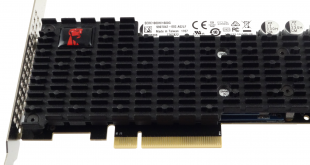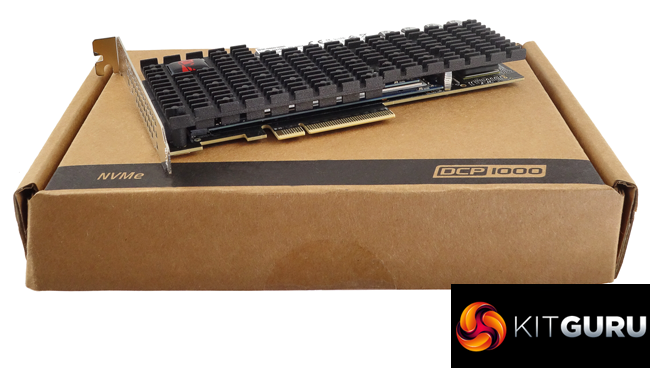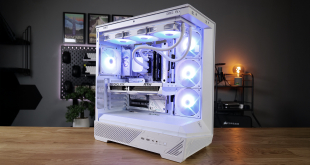
Kingston's DCP1000 SSD sits under the companies Enterprise banner and has been designed for extreme performance in the flash-based data centre environment. When Kingston say extreme performance, they're not joking; this is a drive capable of delivering reads at close to 7GB/s and writes up to 6GB/s!
Developed in cooperation with Liqid Inc, masters of designing data centre architecture with Kingston providing the hardware and Ligid in charge of the firmware, the DCP1000 comes in three capacities; 800GB. 1.6TB (the drive submitted for review) and the flagship 3.2TB drive.
The quoted performance figures for the drive are absolutely crazy! The 1.6TB drive has Sequential read/write figures of 6,800MB/s and 6,000MB/s respectively, the 3.2TB and 800GB drives have the same read speed with the write speed of the 3.2TB drive the same as the 1.6TB drive while the 800GB drive writes fall back to 5,000MB/s.
Random read/write figures are mind boggling. The 1.6TB drive is rated up to 1.1m, yes that's 1.1 million IOPS for reads with writes at 200,000 IOPS. The flagship 3.2TB drive is slightly slower at 1m IOPS for reads and 180,000 IOPS for writes while the 800GB drive only manages 900,000 IOPS for reads and 145,000 IOPS for writes.
At the heart of the drive are four Kingston M.2 NVMe SSD's each with, in the case of the 1.6TB drive, 400GB of capacity. Each of the drives uses a PhisonPS5007-11 eight-channel controller along with eight packages of Toshiba 15nm MLC NAND. A PLX PEX8725 24-lane PCIe Gen 3 switch sits between the drives and the PCIe 3.0 x8 board connector.
The drives can be used in a number of ways including RAID arrays and the drive is also bootable. Kingston provide endurance figures the drive as a whole and for the individual drives. Stated endurance for the 1.6TB drive as a whole is 1820TB TBW with each of the 400GB drives rated at 375TB TBW.
Kingston back the drive with a 5 year warranty.
Physical Specifications:
Usable Capacities: 1.6TB
NAND Components: 4 x Kingston 400GB PCIe Gen 3 NVMe SSDs
NAND Controller: 4 x PhisonPS5007-1, PLX Technology PEX8725 PCIe 3.0 switch
Interface: PCIe 3.0 x8
Form Factor: HHHL (half-height, half-length)
Dimensions: 168 x 69 x 18 mm
Drive Weight: 209g
Firmware Version: E7FTD4.7
 KitGuru KitGuru.net – Tech News | Hardware News | Hardware Reviews | IOS | Mobile | Gaming | Graphics Cards
KitGuru KitGuru.net – Tech News | Hardware News | Hardware Reviews | IOS | Mobile | Gaming | Graphics Cards




Would it be possible to do game load times in benchmarks? Some engines, e.g. Frostbite, REDengine, RAGE, are extremely impacted by SSD/HDD performance so it’d be great to see how much of an impact such a product has on loading times.
What is the MTBF for this drive? Given the read write times. Normal day to day and say video editing on a daily basis?
“Stated endurance for the 1.6TB drive as a whole is 1820TB TBW with each of the 400GB drives rated at 375TB TBW”
Depends how much you write per day. 100GB/day would give an estimated 18200 days. 1TB/day would give an estimated 1820 days.
I’ve got a 950 Pro for close to 2 years, that’s now hit 40TB written (rated 400TBW), it’s used as a buffer drive for recordings, temp drive, and to store games on.
I’ve also got a 960 Evo, had it for about a year, is only used for OS and smaller apps like office / photoshop etc, that’s now at 6.8TB written, (rated 100TBW).
Edit: also both drives have only gone down to 99% drive life remaining according to SMART, despite having used 10% and 6.8% of their rated writes. Google the ssd endurance test, some drives almost made 2000 TBW before failing outright, and thats a few years old.
Edit edit: have a look at this;
http://www.guru3d.com/news-story/endurance-test-of-samsung-850-pro-comes-to-an-end-after-9100tb-of-writes.html
That would be interesting to see, especially with comparisons against other drives in similar raid arrays as this raid on card